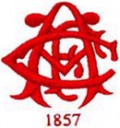|
Having beaten one of the Scottish Football Union\'s founder members West of Scotland FC last Saturday Hawks now meet another Edinburgh Academicals FC in the Scottish Cup Final a week on Saturday at Murrayfield
Edinburgh Accies have on of rugby\'s proudest traditions stretching back to 1857
Recently Neil Drysdale featured one of their early stalwarts
NEIL DRYSDALE WROTE
Leslie Melville Balfour-Melville - so good
they named him twice -
Granted, we have to roll back the years until 1882, on Saturday, July
29, when a large crowd convened at Raeburn Place in Edinburgh to
witness a meeting between Leslie Balfour-Melville\'s hosts and William
Murdoch\'s tourists, but the occasion is worth celebrating, not least
because, exactly a month later, the majority of these same Australians
were involved in one of the most significant acts in sporting history
when they beat England at The Oval and proved the catalysts for a
subsequent 125 years of ferocious Ashes rivalry.
Born in Edinburgh in 1854, Leslie Melville Balfour-Melville - so good
they named him twice - was in the words of the current Cricket
Scotland historian, Neil Leitch: \"Our equivalent of W G Grace or,
perhaps more accurately, C B Fry.\"
Indeed there is a decent argument for saying he was the greatest
sporting figure ever produced by his nation.
\"He excelled in every game he turned his hand to,\" continues Leitch,
\"and had perfect hand-eye co-ordination and balance, which meant he
strode like a colossus across the scene in the later half of the 19th
century.\"
In February, 1872, at the age of 17 years and 10 months, he turned out
for Scotland\'s rugby collective against England in the second meeting
between the now-traditional rivals; he also triumphed in the Scottish
Lawn Tennis Championship in 1879, in addition to securing the British
Amateur Golf title in 1895 and became a Scottish billiards champion in
the 1880s. He was also a distinguished ice skater, curler, distance
athlete and long-jumper.
In the summer of \'82, however, his energies were concentrated solely
on cricket and, while opportunities for international fixtures were
rare, he was the natural choice to lead the Scots as they strove to
gain revenge for an innings loss against the Australians at the same
venue on July 27 and 28.
On a grey morning, the touring party, perhaps arrogantly, elected to
bat after winning the toss, and there was little sign of the drama in
store, as they advanced to 46 for 0 with George Palmer and Tom Garrett
surviving an early onslaught from Peter Thompson, prior to Robert
Macnair entering the attack and sparking a collapse, which
increasingly thrilled the voluble crowd.
First, he bowled Palmer, then Garrett was run out for 28 and suddenly,
wickets tumbled in an almighty clatter, and 51 for 1 was transformed
to 63 for 5 as the middle-order folded, Jiffy bag-style, and with the
Australians unable to break the shackles imposed by Thompson and
Macnair - who, between them, bowled 52 overs and snapped up a combined
haul of six for 66 - a devil of a struggle confronted their tail,
which wagged, but by no means enough to extricate them from the mire.
Eventually, in mid-afternoon and despite a trenchant unbeaten 22 from
Murdoch, they were dismissed for 122.
It appeared a sub-standard tally, but we shouldn\'t forget that the
Scots had previously failed to post 150 in two innings, so nothing
could be taken for granted.
Yet, if there were nerves jangling elsewhere around the Grange,
Balfour-Melville was an ocean of tranquillity, amid the mounting
hubbub.
He amassed runs gradually, inexorably, and found willing partners in
Alfred Wood (15), Joseph Cotterill (24) and James Walker (19), whose
contributions may sound modest, but not with Balfour-Melville
progressing obdurately to 73 as the Australians were bested by seven
wickets, with the shadows starting to lengthen at the Edinburgh
ground.
This was a magnificent performance from the wicket-keeper-batsman and
one longs for Ryan Watson, Fraser Watts or Gavin Hamilton to launch a
similar salvo in the Caribbean.
Yet, befitting the gracious Balfour-Melville, he insisted that his
players batted on after their success to provide the spectators with
value for money, and made scant commotion later about the shock result
which he had been instrumental in orchestrating. There were no
clenched fists, high-fives, post-match press conferences or
man-of-the-match awards. It was, quite literally, a different world;
one in which this genial individual thrived.
Incredibly - or perhaps not - Balfour-Melville was subsequently
recalled to the Scotland ranks at the age of 55 in 1909 and batted on
into his 70s, while becoming the captain of the R & A Golf Club of St
Andrews, and president of the newly re-organised Scottish Cricket
Union.
His death, in 1937, went relatively unnoticed, but his myriad
achievements were belatedly recognised in 2002 when Balfour-Melville
was one of the original 50 inductees into Scotland\'s Sporting Hall of
Fame.
This article was originally posted on 23-Apr-2007, 07:15 by Hugh Barrow.
Last updated by Hugh Barrow on 23-Apr-2007, 07:16.
|

|







